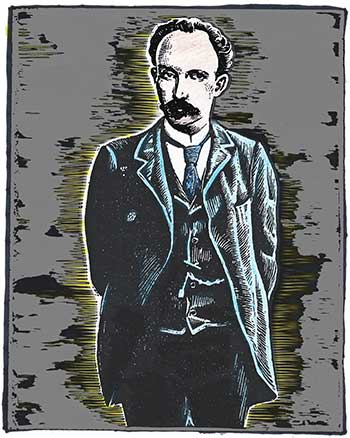
"You take your rights, you do not beg for
them;
you do not buy them with tears but with blood."
- José
Martí
José Martí: apostle of Cuban Independence
part 1 | 2 | 3
by Jerry a. Sierra

While preparing his defense for the 1953 attack on the Moncada barracks, the first act of unified rebellion against Cuban dictator Fulgencio Batista, Fidel Castro requested the writings of his idol, José Martí. The Batista regime denied him access to Martí’s work, or even paper on which to prepare his case, but in the now famous “History Will absolve Me” defense speech, Castro cited, from memory, ten references to the works of Martí.
More than twenty years later, when Ronald Reagan and the U.S. government began to broadcast state-funded, anti-Castro radio programs at the island, they named their station after the long lost Cuban hero. Radio Martí eventually developed a television counterpart, called TV Martí.
“Carlos prío, Fulgencio Batista and Fidel Castro have all claimed to be putting into practice the philosophy of Martí,” wrote John M. Kirk in his 1977 article in the Journal of Latin american Studies. (Kirk)
Who was José Martí, and why does everyone use his name so freely to validate and promote their vastly contrasting philosophies and political views?
“Martí is the liberator of always and forever” wrote Eduardo abril amores in the Cuban newspaper El Diario de Cuba of May 19 1942. “The warrior of every epoch and the eternal thought of Cuba. Nobody has said, since Martí’s death, anything that he had not said. He was the pinnacle of Cuban liberty, of the Cuban ideal, and of Cuba’s political genius. Martí was Cuba’s Infinite. Martí reached a point beyond which there is nothing.” (amores)
“In Latin america,” wrote Roberto Gonzalez Echevarria in his introduction to José Martí Selected Writings (penguin Books), “Marti represents an idealized fusion of politics and poetry.” (allen)
“The historic tendency of Cuban political activists to appropriate Martí’s image and interpret his words for their own purposes is well known,” wrote Lillian Guerra in The Myth of José Martí.
“His words are quoted like Biblical sayings,” wrote Erna Fergusson in her 1946 book Cuba. “It is our loss that we do not know Martí. Much that he wrote of the democratic ideal, of tolerance, and of personal relations in a political world, is freshly applicable to today’s problems.” and to the problems we face in 2015.
Martí/apostle - part 1 | 2 | 3 | Marti Lives |
articles by José Martí
Our america |
antonio
Maceo | My Race |
Montecristi Manifesto |
Our Ideas |
Cuban Revolutionary party |
platform of the Cuban Revolutionary
party (CRp) | Secret Statutes of the
CRp | Order to Revolt
Letters José Martí
Letter to Maximo Gomez, 1884 (in which
he resigns from the revolutionary movement) | Last letter
to his mother, March 25 1895 |
Unfinished letter to his friend Manuel
Mercado, May 18 1895 | To antonio Maceo:
July 20 1882 /
June 18 1894 /
June 22 1894 /
January 19 1895
José Martí portal | Timeline | Books | photos